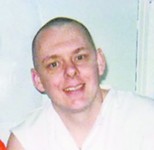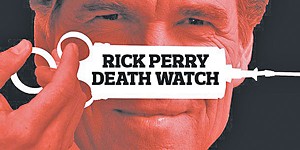Point Austin: It's Not About Sharon Keller
The Texas system of justice is found wanting once again
By Michael King, Fri., Sept. 4, 2009

Keller's defense? That her response was only an "administrative" decision (although in a related civil case, she claimed judicial immunity); her lawyer, Chip Babcock (tap dancing as best as he could), told District Judge David Berchelmann Jr. that the charges against his client unfairly presume a "black-and-white world," not the "nuanced" one we actually live in. This from a defendant who once argued that finality of judgment takes precedence over any evidence of innocence. As Charles Kuffner (author of political blog Off the Kuff) aptly put it, "According to Judge Keller, we do live in a black and white world, one in which the prosecution is always correct and never at fault, and the defense is always wrong."
Although she could be removed from office for bringing discredit on the Texas judiciary (and the shame of this tale has indeed generated international headlines), Keller is unlikely to receive more than a reprimand – and likely to be returned to the bench where she routinely shows neither justice nor mercy to appellants abused by the Texas courts. There's some slim hope that should she run for re-election in 2012, voters might recall this sordid episode with embarrassment – then again, plenty of Texans relish Keller's approach to "justice," especially when it comes to capital punishment.
No Crime, Guilty Anyway
The Texas death penalty system has been much in the news of late because of the Keller trial and more recently over the belated exoneration of Cameron Todd Willingham – executed in 2004 for the 1991 arson murder of his three children at his Corsicana home. The case against Willingham rested entirely on the testimony of official investigators who opined that the burned house showed clear and abundant evidence of arson. Thanks in part to the efforts of the Innocence Project, three separate forensic investigations – the latest one an official report to the Texas Forensic Science Commission – concluded that not only was Willingham innocent of murder; no crime had even occurred.
On Aug. 25, the Chicago Tribune reported that forensic scientist Craig Beyler found that the fire marshal who investigated the fire was "wholly without any realistic understanding of fires and how fire injuries are created" and employed theories that "are nothing more than a collection of personal beliefs that have nothing to do with science-based fire investigation." Beyler concluded not only that there was no reason to believe the fire was caused by arson, but that investigators ignored more likely causes (e.g., malfunctioning electrical outlets or appliances).
The story is laid out at length by David Grann ("Trial by Fire") in the Sept. 7 New Yorker and has already been amplified by The New York Times' Bob Herbert ("Innocent but Dead," reprinted in Wednesday's Statesman). In addition to the completely botched arson investigation, equally intriguing about the story is how, once the prosecutors had targeted Willingham, even eyewitnesses began to alter their memories of the night of the fire. If the father had set the fire, he wouldn't have tried to get back into the house to save his kids, they recalled – even if that's what they saw on the night it happened.
Predictably, these revelations have been met with indignant outrage from then-Navarro County prosecutor John Jackson (even more predictably, now a district judge). Despite the "undeniably flawed" forensic investigation, Jackson wrote, there was other "independent" and "overwhelming" evidence of Willingham's guilt, which in his summary amounts to: There might not have been a crime, but Willingham deserved to die anyway.
Yet Jackson admits he offered Willingham a plea that would have saved his life – and this "violent sociopath" nevertheless refused to admit to a crime he did not commit.
The Dance of Death
Just the latest chapter in Texas capital justice. It will be interesting to see how the Forensic Science Commission responds to Beyler's report, which on its face would require the state of Texas to acknowledge having executed an innocent man. One of Willingham's cousins told the Chicago Tribune: "It's difficult for me to believe that the State of Texas or the governor will take responsibility and admit they did in fact wrongfully execute Todd. They'll dance around it."
Hard to argue with that prediction, or with the similar likelihood that the Commission on Judicial Conduct will find a way to excuse Judge Keller's willful negligence in preventing due process for Michael Richard. Absolute, black-and-white standards of guilt apply only to accused prisoners standing before the criminal bench. If the investigators botch the evidence, if the prosecutors skew the scales, if the judge "administratively" slams the door at 5pm to a man scheduled to die at 6pm – well, in our "nuanced" world, mistakes will inevitably be made.
So they will. In the end, it's not really about Judge Keller or Judge Jackson at all, but about our own willingness to turn away from – or even to applaud – the inevitable consequences of assuming the power of life and death, and of granting that power to quite fallible public officials. Except in immediate self-defense, we don't have the right to kill – how do we conceivably presume we can grant any such right to the state?
We're all of us standing at the courthouse door, quietly declaring: "We close at 5pm."
Got something to say on the subject? Send a letter to the editor.










